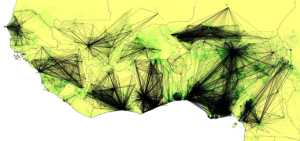First reports of the Ebola outbreak in Western Africa appeared in March 2014 and over time, it has developed rapidly as the deadliest outbreak of the of the disease since its discovery. Ebola is transmissible by means of bodily fluids and can affect a person anytime from 2 to 21 days after. During this time, victims may have no knowledge that they are infected. For this reason, it is vital to be able to track where people have been and where they are going.
Epidemiologist and associate director of the Center for Communicable Disease Dynamics, Caroline Buckee, has recently been working with a team of researchers to use cell phone data to track people’s travel patterns across West Africa in an effort to fight the Ebola epidemic.
For a moment, consider how often you carry your cell phone. Personally, I never forget this important device whenever I travel. Cell phones are ubiquitous in almost all countries – even those of different financial backgrounds. They have the ability to generate massive amounts of data about human mobility. Cell phone “ping” towers make this possible.
A cell phone’s “ping” refers to the process of determining its location, with reasonable accuracy, at any given point in time. By using a phone’s GPS location capabilities, it is relatively easy to track its movements. Specifically, “to ping” is the process of sending a signal to a particular cell phone and in return, receiving the requested data. Thus, these “pings” from cell phone towers have the capability to exhibit where people have traveled after leaving an area with an Ebola outbreak. This can indicate where a disease cluster may appear next and where to concentrate health care efforts.
According to the Harvard School of Public Health, Buckee and her colleagues are currently working with a Swedish nonprofit organization named Flowminder, in an effort to analyze data from Senegal and Ivory Coast. The West African mobile carrier, known as Orange Telecom, has used the aforementioned data collecting method to provide the information for this research.
Nevertheless, in a November article in the Boston Globe, Buckee asserted, “The first priority has to be clinical, just getting people cared for and treated.” She goes on to describe the necessary planning policies, including projections for “how many beds they’ll need, how many gowns to send out, and where to send them.”
Last month, in a separate study published in Science, Yale researchers developed a model that tested the effects of interventions, such as tracing all the contacts of a sick person. This model suggests the virus will infect 224 new people each day in Liberia alone. They asserted that unlike past outbreaks, “where single measures such as ensuring burials were don’t in a sanitary way may have been sufficient,” their study found that multiple actions may be needed to contain the disease. Their study design helps to reduce biases and is thus more credible. Ultimately, this study is relevant in accessing the actions that health care officials can potentially take after gaining knowledge of Ebola from cell phone data.
Data collection with cell phones is just one means examining the spread of this epidemic. Researches have continued to use conventional methods, such as surveys, in order to analyze population movements. However, mobile phones can amass huge databases containing information on population movements and social patterns in a way that other sources can’t. For this reason, they may have life-saving potential.
Sources:
http://www.technologyreview.com/featuredstory/513721/big-data-from-cheap-phones/
http://www.hsph.harvard.edu/caroline-buckee/
http://pursuitmag.com/locating-mobile-phones-through-pinging-and-triangulation/
http://www.bostonglobe.com/metro/2014/11/02/ebola-disease-modelers-new-england-help-predict-future-spread-best-strategies/LZHSEGlInJs6SflLWW0yaP/story.html


I think this is a clever way of tracking down a disease. It makes me wonder what it must of been like a century ago when there were not cell phones and disease was still very prevelent. I find it crazy when I hear about Ebola situations in the news about how they find everywhere someone infected has been and they have to completely clear out that place. Also, it is sort of creepy how you can track everywhere someone has been by tracking their cell phone.